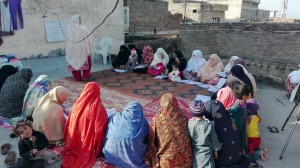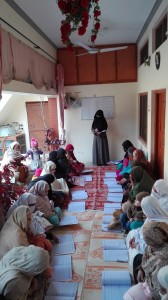Khyber Pakhtunkhwa has some of the Pakistan’s largest gender disparities in education. With the exception of a few urban cities, young girls are less likely to enter the schools and more likely to drop out at primary level, leaving only a few that make it through the secondary schools.
This limited access to female learning has led to a situation where, according to the Pakistan Social and Living Standards Measurement Survey 2014-15, more than three out of every five women in the province have yet to learn how to read and write.
Reema Gul was among the fortunate ones though. Hailing from Village Shah Noor Pull in Mardan district, she managed to complete her Intermediate despite a financially disadvantaged background, eight siblings, and an ailing father who used to do labour jobs.
“I had always thought my education to be a ticket to better life and a means to support my family,” recalled Ehsan in a contemplative manner. “Little did I know that my endeavours to support myself as well as the family would be deterred by the culturally authoritative attitudes in the society, where only males were supposed to take this role.”
For long she awaited a ‘culturally-endorsed’ opportunity for a woman to work outside the home.
She finally got break last year in November, when an Islamabad-based research and development organisation, Institute of Social and Policy Sciences (I-SAPS), came up with an initiative called “SMS-based Adult Female Literacy Programme” in collaboration with the Mobilink Foundation.
With identification, support and approval from the same community that earlier dissuaded her from fulfilling her endeavours, Gul was recruited on a decent remuneration as one among the 150 teachers to implement the initiative in their respective villages.
“Each of these teachers, after several rounds of rigorous trainings, have taken charge of 150 Adult Literacy Centres (ALCs) in eight districts of Mardan, Swabi, Nowshera, Buner, Malakand, Haripur, Mansehra and Kohat,” said Noman Ahmed, a research associate with I-SAPS.
Having the strength of 25 to 30 learners in each of the selected villages, explained Ahmed, the ALCs are now enabling over 4,000 adult females to read newspaper, write in Urdu, perform everyday calculations and gain life skills with the help of four specifically-designed textbooks and freely-given mobile phones.
Zainab Bibi, another recruited teacher from Baramkha Khel village in Nowshera district, asserted that the recruitment and training of female teachers under the initiative would help create a virtuous cycle in the local communities.
“As more female teachers are trained to impart basic literacy to their fellow adult females, more literate mothers are available for the education of next generation,” she said. “The initiative is not only helping me to support my family, but also has enabled me to positively contribute in the lives of 25 more fellow women by educating them.”
Making the impossible possible
Ahmed explained that this limited access to female learning is mainly influenced by social and cultural attitudes, conservative beliefs, early marriages, and few female teachers in a society that shuns interaction between females and unrelated males.
“In order to address this challenge of illiteracy,” he explained, “the prevailing development discourse becomes entangled in confronting the cultural and social barriers, and thus leads to a dead-end job by antagonising the local communities.”
As an alternative, I-SAPS’s initiative amicably navigates through these social biases and cultural practices. “Our idea was to give respect to the existing cultural and social norms while developing a sense of ownership amongst the local communities in providing basic literacy to their female family members in a close proximity to their homes,” said Ahmed.
Since community ownership was deemed a cornerstone to make this initiative sustainable, respected elders and influential individuals of the villages were engaged, sensitised and grouped in the form of 154 Village Education Support Committees for their practical involvement in the planning and execution of the initiative.
The community members, who were initially negative and in some cases even hostile when approached to allow their female family members to participate in the initiative, were later found advocating on behalf of female education in many interesting ways.
Many of them dedicated a portion of their homes to be designated as ALCs for female learners of their respective villages. Others opened up the historically male-exclusive hujras, which play host to various aspects of social life in Pakhtoon culture, for female education. More support arrived form prayer-leaders in some districts, who made announcements in support of the initiative in their largely religious and traditional neighbourhoods.
“As a result, and perhaps for the first time, the seminaries meant for the religious education of girls opened their doors to adult females for organising their basic literacy classes under the initiative,” said Ahmed.
The initiative also gives consideration to the fact that available literacy materials are not well adapted to the daily lives of adult learners in terms of content and the learners find it hard to retain their interest in learning after completion of the basic coursework. “A customised curriculum along with textbooks and the use of mobile technology for sustained learning is the innovation being implemented under the initiative,” stated Ahmed.
As the learners gained some level of literacy during their basic coursework, each of them has been provided with a mobile phone in order to practice and further develop their newly acquired skills by sending answers to the received set of questions.
The participants of the initiative happily report how inter-generational learning has already begun with mothers and sisters passing on their new literacy skills to their children and siblings. “Now, I can keep an eye on the lessons being taught and homework to be done by my six-year old daughter,” said Minhas Bibi, who studies at a an ALC established in Keekar village of Mardan district.




